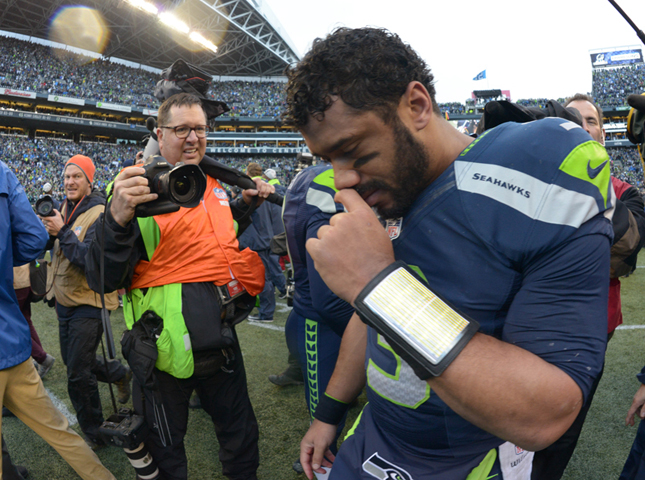
Seattle Seahawks quarterback Russell Wilson bows his head in prayer after the overtime victory over the Green Bay Packers in the NFC Championship Game on Jan. 18 at CenturyLink Field. The Seahawks defeated the Packers 28-22 in overtime. (RNS/Reuters/USA Today/Kirby Lee)
Did God lift Seahawks quarterback Russell Wilson's overtime pass into the end zone on Jan. 18, rewarding the prayerful Christian player with a championship victory and a trip to the Super Bowl?
Millions of Americans may think so.
"One in four Americans believe there will be a 12th man on the field, and that the hand of God will be seen before the final whistle blows in the Super Bowl," said Robert Jones, CEO of Public Religion Research Institute.
And 53 percent agree God "rewards athletes who have faith with good health and success," according to a new PRRI/RNS Religion News Survey released Thursday.
Indeed, not only did majorities of all but one major religious group put faith in God's rewarding the faithful, so did 27 percent of the those who claim no religion, the "nones."
The survey of 1,012 U.S. adults, conducted by PRRI in partnership with Religion News Service, measures how people interweave team spirit and spirituality -- and moral wrath, too. Nearly one in three Americans would slap a lifetime ban on players convicted of domestic violence, even for someone on their favorite team.
Most Americans (64 percent) have a favorite team, with football leading the way as the preferred sport for 40 percent, no matter what their professed faith.
However, NFL love is not blind. It stops at the Ray Rice elevator door -- the one the Baltimore Ravens player dragged his fiancee through after knocking her unconscious in February 2014. The survey was conducted Jan. 14-18, after months of intense media coverage of Rice and the NFL's response to domestic violence. Rice was initially suspended by the Ravens, then by the NFL, but ultimately reinstated on appeal and is now eligible to sign with another team.
"I was surprised at how seriously Americans are taking domestic violence in sports. Nearly one in three [29 percent] would support a lifetime ban for a player convicted of domestic violence," said Jones. "That's a heavy penalty."
Most (59 percent) would allow such a player to return after a temporary suspension.
But few would make that easy. Nearly two in three Americans (64 percent) would oppose a professional sports team's hiring a player "who has been convicted of domestic violence but is not in current legal trouble."
Contrast that with a hiring choice once thought to be too hot to touch: signing an openly gay or lesbian player.
University of Missouri star Michael Sam became front-page news for his openly gay status, which became public just months before the NFL draft last year. He was drafted by the St. Louis Rams and had a tryout with the Dallas Cowboys but did not make either team.
Survey respondents greeted the issue with a shrug: 73 percent say they would favor a team's drafting a gay or lesbian player.
Even so, there's an overwhelming sense that this is not an easy road for these athletes: 88 percent, including majorities of every major religious group, say gay and lesbian athletes face discrimination in professional sports.
For all the controversies, Americans are still captivated by football.
Eighteen percent of Americans -- led by 45 percent of white evangelical Protestants and 30 percent of Catholics -- say they are more likely to watch football any given Sunday than go to church.
But overall, men and women of all major faiths are mostly alike: About a quarter of both genders choose church, and about another quarter say they devote the day to both God and gridiron.
Who's missing from football frenzy? One in three Americans overall (32 percent), including 60 percent of "nones."



